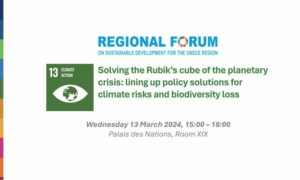Event Conference
Solving the Rubik’s Cube of the Planetary Crisis: Lining Up Policy Solutions for Climate Risks and Biodiversity Loss | RFSD 2024

13 Mar 2024
15:00–18:00
Venue: Palais des Nations | Room XIX & Online | UN TV
Organization: UNEP Europe Office, United Nations Economic Commission for Europe, World Meteorological Organization, United Nations Office for Disaster Risk Reduction, United Nations Children’s Fund, United Nations Educational, Scientific and Cultural Organization
This peer learning round table to the 2024 Regional Forum on Sustainable Development comprised two sections. It focused on the importance of strengthening preparedness to climate extremes through multi-hazard early warning systems, and on holistic policies that simultaneously address both the biodiversity and climate crises.
About this Event
This peer learning round table to the 2024 Regional Forum on Sustainable Development comprised two sections. The first half focused on the importance of strengthening preparedness to climate extremes through multi-hazard early warning systems, building on the Early Warnings for All (EW4All) initiative of the UN Secretary General, which aims at spearheading action to ensure every person on Earth is protected by early warning systems by 2027. The second half explored the ways in which climate change and biodiversity loss can and should be addressed together with policies having largely tackled these challenges independently.
The roundtable was organized by the UN Issue-based Coalition on Environment and Climate Change for Europe and Central Asia, comprising 17 UN entities active in the region. The first part is planned by the World Meteorological Organization (WMO), the United Nations Office for Disaster Risk Reduction (UNDRR) and the United Nations Children’s Fund (UNICEF). The second part is planned by the United Nations Environment Programme (UNEP) and the United Nations Education, Scientific and Cultural Organization (UNESCO). The event is coordinated by the United Nations Economic Commission for Europe (UNECE), the United Nations Environment Programme (UNEP) and UNESCO.
Climate-related risks and extreme events
Managing the risk of climate-related disasters relies on effective prevention and preparedness actions and instruments, which can help reduce or avoid the detrimental impacts of hazardous events. The Sustainable Development Goals, Paris Agreement and Sendai Framework for Disaster Risk Reduction 2015-2030 identify strengthened early warning systems as a critical component of building resilience to disasters and crises and, by extension, contributing to sustainable development. Early warning systems rely on multi-sector and multi-stakeholder coordination, community involvement, enabling environments, as well as clear roles, responsibilities and adequate capacities.
The Roundtable will focus on the importance of strengthening preparedness for and managing risks of climate extremes through multi-hazard early warning systems, building on the Early Warnings for All (EW4All) initiative of the UN Secretary-General, which aims at spearheading action to ensure every person on Earth is protected by early warning systems by 2027, while also recognizing the unique vulnerability of children.
This part of the event aims to respond to the following guiding questions:
- What policy and other instruments have proven most effective in reducing risks resulting from a changing climate? How can their impact be measured?
- What inclusive adaptation policies and activities have proven effective in ensuring no-one is left behind, including women, children and youth, people living with disabilities and other disadvantaged groups?
- How can we optimize climate financing, including for early warning system development, to ensure both resilience-building and long-term sustainable development?
Jointly addressing climate change and biodiversity loss
Climate change and biodiversity loss are closely interconnected: they share common drivers, they interact, and both have cascading and complex effects that impact human well-being and quality of life. Climate change is one of the main drivers of biodiversity loss; at the same time, ecosystems and their biodiversity play a key role in delivering benefits for both climate mitigation and adaptation. However, nature’s contribution to tackling climate change is at risk. For instance, ecosystem degradation through land-use change is a major contributor to cumulative CO2 emissions and, therefore, a driver of climate change. Biodiversity loss also contributes to land degradation and weakens agricultural systems, food systems and livelihoods.
Although the biodiversity and climate crises are closely intertwined, previous policies have largely tackled these challenges independently. Moving forward, these crises must be tackled together with holistic policies that address both issues simultaneously. That’s why integrated approaches, such as nature-based solutions, will be essential, including those that rely on nature to mitigate and adapt to climate change.
This part of the event aims to respond to the following guiding questions:
- How can we promote greater coherence between national climate, biodiversity and economic development strategies? How can we overcome the obstacles to designing holistic policies that jointly address climate change and biodiversity loss while mitigating their socioeconomic impacts?
- How can those living in ecosystems impacted by climate change and biodiversity loss join forces with scientists and the private sector to jointly develop and demonstrate evidence-based local policy solutions?
- How can we enhance the coherence of and promote synergies between climate and biodiversity financing in line with country priorities, including for nature-based solutions?
Speakers
Climate-related risks and extreme events

Prof. Celeste SAULO
Secretary-General, World Meteorological Organization

H.E. Amb. Sharaf SHERALIZODA
Permanent Representative of the Republic of Tajikistan to the United Nations Office and other international organizations in Geneva

Mihaela FRASINEANU
State Counsellor, Romania

Senad TUTIĆ
Director, Center for Social Welfare, City of Bihac, Bosnia and Herzegovina

Blaž LIPOVŠEK
President, Sava Youth Parliament

Lornaliza KOGLER
Team Lead, Information Unit in the Transparency Division, UNFCCC Secretariat

Ani BERAIA
Member, Youth Health Organization | Co-founder, Youth for Public Health, Georgia
Jointly addressing climate change and biodiversity loss

Prof. Thomas CROWTHER
Department of Environmental Systems Science, Federal Institute of Technology Zurich | Chair of the Advisory Council for the UN Decade on Ecosystem Restoration | Founder, Restor

Teodora GRNCAROVSKA
State Counsellor on Climate Change, Ministry of Environment and Physical Planning, North Macedonia, and Adjunct Assistant Professor, South East European University

Veronica TOMEI
Commissioner, Sustainable Development, Federal Ministry for the Environment, Nature Conservation, Nuclear Safety and Consumer Protection, Germany

Dan CRONAN
Assistant Professor, College of Environmental Science and Forestry, State University of New York

Alexandra MASAKO GOOSSENS-ISHII
Soka Gakkai International

Sandeep SENGUPTA
Global Policy Lead, Climate Change, IUCN
Moderators

Marco KEINER
Director, Environment Division, UNECE

Arnold KREILHUBER
Directo, Europe Office, UNEP

Magdalena LANDRY
Director, UNESCO Regional Bureau for Science and Culture in Europe
Video
RFSD 2024
The Regional Forum for Sustainable Development 2024 will take place in Geneva on 13 and 14 March 2024, preceded by pre-meetings on 11 and 12 March. While taking place at a time of multiple crises, including the triple planetary crisis, in recognition of the strong affirmation of the 2030 Agenda at the SDG Summit, Governments and Stakeholders across the UNECE region are now looking for impactful, innovative and crisis-resilient policies and solutions to accelerate the implementation of the Sustainable Development Goals.
Against this background, the theme for the 2024 Regional Forum is: “Reinforcing the 2030 Agenda for Sustainable Development in the Economic Commission for Europe region in times of multiple crises: The effective delivery of sustainable, resilient and innovative solutions”.

